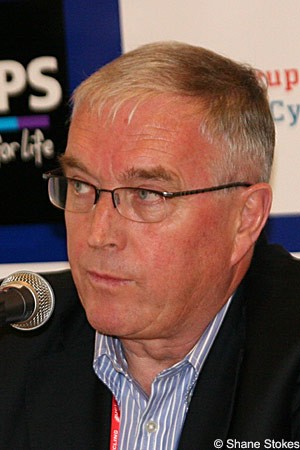Governing body could offer compromise
 The UCI has confirmed that it is studying the race radio situation and could potentially be open to measures to provide limited radio communication to riders in the peloton.
The UCI has confirmed that it is studying the race radio situation and could potentially be open to measures to provide limited radio communication to riders in the peloton.
While nothing has been decided, its president Pat McQuaid told VeloNation this evening that it is looking at the safety concerns expressed, and is considering various options.
“The UCI is very serious about the safety of the riders and we are currently in contact with several communications companies about that,” he told VeloNation. “We are working on putting something in place which will deal with the safety aspects in races, and what Christian Prudhomme suggested would be one of the possibilities that we would look at.”
Tour de France race director Prudhomme spoke on the race radio issue in recent days. He appeared to agree with the UCI’s reasoning that stoping team manager-rider communication would lead to better racing. However he didn’t believe in eliminating every form of contact. “A racer without radio is more intelligent than one with a radio. The instinct and the sensing of the course come out better that way,” he told rtbf.be. However he then added: “If it’d be up to me, yes, there would be a radio, but only one from the organizers to give security instructions.”
McQuaid’s position today seems a departure from the blanket ban advocated in the past. It’s quite possible that the UCI has realised that there are genuine concerns out there; because of that, a new solution has been sought.
“Safety is obviously an important factor and we are trying to find a way of dealing with the safety while not giving in on the fundamental issue [radio contact between the team car and the riders],” he said. “It is possible that some limited form of radio communication could be foreseen in the future.
“Right now there are studies going on…we are meeting different companies and getting different perspectives and different views. A decision will be made some time this year.”
The UCI recently received mixed news on the issue. The European Cycling Union (UEC) said that it was fully supportive of the governing body, while USA Cycling announced that it had revered an earlier decision to ban radios from National Racing Calendar (NRC) races.
UCI and AIGCP currently at odds:
The AIGCP represents the interest of teams, and earlier this year was involved in a protest at the Challenge Mallorca events. Riders turned up for the first race wearing radios, defying UCI rules forbidding their use in any non-World Tour events this season. Tyler Farrar (Garmin-Cervélo) won the race, but learned afterwards that the UCI was going to void the result because of the protest.
A similar action planned for the Tour of Qatar was cancelled, as was one at the Omloop Het Nieuwsblad. However on March 4th, the AIGCP issued a statement saying that its members unanimously rejected a ban, and also the manner in which it said the UCI pushed it through. It said that if the UCI did not reverse the legislation by May 1st, it would take unspecified ‘drastic action.’
Since then it has been claimed by Belgian media that the teams would boycott the new UCI event, the Tour of Beijing.
When asked by VeloNation if discussions were possible, McQuaid said that the UCI wouldn’t sit down with the AIGCP as long as that threat was on the table. “The UCI won’t go into talks with anybody in a form of blackmail…and that is blackmail,” he said. “The UCI couldn’t accept to go into discussions until such time as that threat is rescinded. Then we are prepared to discuss it.”
When the idea of a partial relaxation of the new rules was put to AIGCP president Jonathan Vaughters, the American was lukewarm about the compromise suggested by Prudhomme.
“I can’t speak for all the teams on this, but I can’t imagine a solution like this that would be pragmatic. There’s language issues, and also selectivity of info. It’s an idea thought up by those who aren’t actually working in the field (as a rider, director, mechanic).”
He said that there were bigger issues than the safety consideration. ‘Why are these decisions being made without vote from riders/teams?’ he asked. “And why are we trying to make cycling an individual sport, not a team sport?”
Even if the limited communication being considered by the UCI doesn’t appeal, it does seem that the governing body is looking at other options than a blanket ban on all radio contact. That in itself is a step forward from the previous position. The weeks and months ahead will determine if a mutual agreement can be found on the issue.